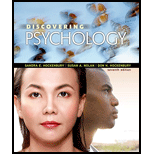
Concept introduction
Extrasensory perception, or ESP, indicates the ability to detect information by some means other than through normal sensation processes. The general term for such unusual abilities is paranormal phenomena. Those who believe in ESP are more disinclined to attribute events to coincidence than those people who do not believe in it.
Explanation of Solution
Suggested responses
Consider how common instances are sometimes used to prove the existence of ESP; however, coincidence and the fallacy of positive instances can help to describe common events that believers may use to validate ESP. Coincidence describes an event occurring by chance, and the fallacy of positive instances is the tendency to recall coincidental events that appear to conform to one’s belief in unusual phenomenon and forget all instances that refute them. Research has shown that those who believe in ESP are disinclined to accurately estimate the probability of an event occurring by chance alone, whereas nonbelievers are typically more realistic about this probability. Consider and write out other reasons why believers in ESP are less likely than nonbelievers to attribute events to chance.
Want to see more full solutions like this?
Chapter 3 Solutions
Discovering Psychology
- Write an example of a personal reflection of your course. - What you liked about the course. - What you didn’t like about the course. - Suggestions for improvement. The Reflection Paper should be 1 or 2 pages in length.arrow_forwardHave you experienced a state of flow? If so, please describe what you experienced, and what factors you think contributed to this occurring. If not, discuss what you think might assist you in experiencing flow. Do you believe it is necessary to be in a state of flow to fully engage in creative work; or is it helpful but not strictly necessary? Support your position with your own observationsarrow_forwardThis unit is designed to introduce students to the principles of community psychology and examine local issues through a lens of social determinants of health. Students will explore varieties of community issues such as homelessness, substance abuse, visible and invisible disabilities, and the public health crisis of racism. By analyzing the ways in which SDH intersects with both physical and mental health, both in their own communities and in differing communities, students will understand how social inequities can significantly impact the overall health of a population. Short Description This activity explores how inequality has both physical and psychological impacts on the individual and the community's health. Students will use a step-by-step analysis of SDH around the world. Instructions Using the unit readings, review the Social Determinants of Health: Public Health Agency of Canada. (2020, October 7). Social determinants of health and health and health inequalities. Government…arrow_forward
- Match the term with its description. Prompts Answers Prime Prime form started at a different pitch level Retrograde The original row Inversion Prime formed backward Transposition Original row with all intervals invertedarrow_forwardWrite an example of a peer evaluation. Instructions: Clarity and coherence of writing Depth of musical analysis Accuracy and relevance of observations Organization and structure of the report Grammar, spelling, and punctuation Originality of workarrow_forwardMusical Interculturalism : Shakira - Waka Waka Instructions: Describe the cultural elements or influences present in the music and how they contribute to the overall sound and meaning. Discuss your personal connection or appreciation for this intercultural musical example. Reflect on how musical interculturalism enhances our understanding and appreciation of diverse cultural expressions through music.arrow_forward
- What examples of musical interculturalism come to mind for you? Example: Shakira - Waka Waka Instructions: Describe the cultural elements or influences present in the music and how they contribute to the overall sound and meaning. Discuss your personal connection or appreciation for this intercultural musical example. Reflect on how musical interculturalism enhances our understanding and appreciation of diverse cultural expressions through music.arrow_forwardI need help finding 12 peer-reviewed articles on body modification that has to do with attractiveness with people with tattoos an those without tattoosarrow_forwardMatch a jazz style with its representative musician. Prompts Answers Progressive Jazz Poncho Sanchez Third Stream Gunther Schuller Fusion Stan Kenton Latin Jazz Miles Davisarrow_forward
- Match the subgenre with the short description. Prompts Answers Progressive Jazz A style that combines elements of jazz and classical music Fusion A subgenre of Latin Jazz that incorporates elements of Brazilian samba Bossa Novia A style that combines hip hop and jazz Jazz Rap A style that, in the 1970s and 1980s, integrated elements of Jazz and Rockarrow_forward12-tone composers: (Mark all that apply) 1) Stressed dissonance and fragmentation 2) Avoided a tonal center 3) Favored extensive programmatic works 4) Created angular and disjointed melodiesarrow_forwardGershwin’s famous composition Rhapsody in Blue uses: (Mark all that apply) 1) Jazz-like rhythms 2) Extended brass sections 3) A clarinet slide 4) References to the bluesarrow_forward
 Ciccarelli: Psychology_5 (5th Edition)PsychologyISBN:9780134477961Author:Saundra K. Ciccarelli, J. Noland WhitePublisher:PEARSON
Ciccarelli: Psychology_5 (5th Edition)PsychologyISBN:9780134477961Author:Saundra K. Ciccarelli, J. Noland WhitePublisher:PEARSON Cognitive PsychologyPsychologyISBN:9781337408271Author:Goldstein, E. Bruce.Publisher:Cengage Learning,
Cognitive PsychologyPsychologyISBN:9781337408271Author:Goldstein, E. Bruce.Publisher:Cengage Learning, Introduction to Psychology: Gateways to Mind and ...PsychologyISBN:9781337565691Author:Dennis Coon, John O. Mitterer, Tanya S. MartiniPublisher:Cengage Learning
Introduction to Psychology: Gateways to Mind and ...PsychologyISBN:9781337565691Author:Dennis Coon, John O. Mitterer, Tanya S. MartiniPublisher:Cengage Learning Psychology in Your Life (Second Edition)PsychologyISBN:9780393265156Author:Sarah Grison, Michael GazzanigaPublisher:W. W. Norton & Company
Psychology in Your Life (Second Edition)PsychologyISBN:9780393265156Author:Sarah Grison, Michael GazzanigaPublisher:W. W. Norton & Company Cognitive Psychology: Connecting Mind, Research a...PsychologyISBN:9781285763880Author:E. Bruce GoldsteinPublisher:Cengage Learning
Cognitive Psychology: Connecting Mind, Research a...PsychologyISBN:9781285763880Author:E. Bruce GoldsteinPublisher:Cengage Learning Theories of Personality (MindTap Course List)PsychologyISBN:9781305652958Author:Duane P. Schultz, Sydney Ellen SchultzPublisher:Cengage Learning
Theories of Personality (MindTap Course List)PsychologyISBN:9781305652958Author:Duane P. Schultz, Sydney Ellen SchultzPublisher:Cengage Learning





